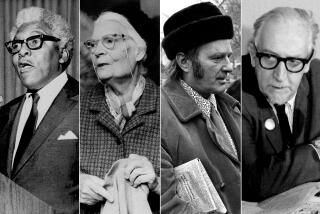Different War, Different Kind of Warrior
- Share via
You are looking at a different kind of war today. It is being fought by American heroes you never heard of.
In a volunteer force, you don’t find Joe DiMaggio, Ted Williams, Phil Rizzuto, Red Ruffing, Enos Slaughter, Joe Louis and Ezzard Charles, as you did in the propeller age.
If you wanted Buddy Young, Sugar Ray Robinson, Howie Pollet, Tom Harmon and Hank Greenberg, you put the hooks on them.
But you ask a guy earning $4 million in sports today if he wishes to join up and he responds: “It’s an interesting option. I’ll get back to you.”
And, of course, he doesn’t.
We are not putting the knock on athletes’ failing to disrupt their incomes by enlisting. Rock singers, actors, oil barons and guys buying and selling on Wall Street aren’t volunteering, either.
The simple point advanced here is, it is a different kind of war, featuring people who don’t have marquee value.
In 1944, 330 players were drafted by teams in the NFL. Detained by their government, all but 12 didn’t play.
It was the kind of year in which the St. Louis Browns actually got to the World Series. That hadn’t happened before, and it wouldn’t happen during the rest of the time the Browns spent on this earth.
OK, Greenberg, renowned batsman, is asked by his draft board to leave the Detroit Tigers and, in 1944, he turns up at our air base in China.
Naturally, he is prevailed upon to get into the softball game--on my side. Others watch him in awe. And what happens? A dog-eared corporal from Steubenville, Ohio, strikes him out three times.
Hank wasn’t voted to the Hall of Fame on the strength of hitting a softball, but rejoining the Tigers late in 1945, he goes to the World Series and knocks in seven runs, including two homers.
Another sports celebrity is drafted by the Germans. Perhaps with an eye to box office, they put the arm on Max Schmeling, making a paratrooper out of a guy who flattens Joe Louis, and vice versa.
And what is Louis doing in the service of his government? First, he defends his title against Buddy Baer for the Naval Relief Fund. Two months later, he takes on Abe Simon for the Army Relief Fund.
Years later, when Louis gets into a jam with the IRS, his record of fighting for military charities is recalled. The IRS lets him off the hook.
If one couldn’t like Joe Louis, one couldn’t like Christmas, Hanukkah or Edith Piaf singing “La Vie En Rose.”
In 1943 and ‘44, players are vanishing to the military at such a pace that two teams in the NFL actually merge. The Steelers join with the Eagles to form a group billed as the Steagles.
George Halas decides he needs a piece of the action. He leaves the Bears to join the Navy. Frank Leahy leaves a championship team at Notre Dame to do the same.
Dug in, waiting for this break, Army the next two years fractures Notre Dame, 59-0 and 48-0.
Training for the Persian Gulf War, branches of the military didn’t even feel the need to put together their own football teams.
What has happened in this conflict to clubs that used to be known as Great Lakes Naval Training, Quantico Marines and Ft. Dix?
During the propeller war, USC was engaging San Diego Navy, March Field and St. Mary’s Pre-Flight. And UCLA was sending its forces against Del Monte Pre-Flight and Alameda Coast Guard.
It’s a stranger war today. The only enemy is on the battlefield. It used to be that service outfits struggled and manipulated among themselves to get an edge in building their football teams.
With slick recruiting, culling players coming into the service, the late Paul Schissler, former coach at Oregon State, built a powerhouse at March Field. He creamed UCLA, 47-7.
Recapturing players at war’s end, UCLA was 10-0 in 1946.
Preparing for the Rose Bowl game against Illinois, Bert LeBrucherie, Bruin coach at the time, faced a player strike. His team of street-smart vets demanded 50 tickets apiece.
They would scalp them to reimburse themselves for the money they blew by not working during the Christmas holiday.
They didn’t get all 50, but they got some, for which they rewarded their coach by losing to Illinois, 45-14.
You won’t see this at the end of the Gulf war. An army of volunteers is another ballgame.
More to Read
Go beyond the scoreboard
Get the latest on L.A.'s teams in the daily Sports Report newsletter.
You may occasionally receive promotional content from the Los Angeles Times.










